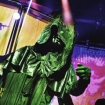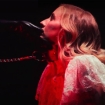While you may not be aware of it, you've definitely seen Jim Louvau's work. You've seen it right here on RevolverMag.com, as well as the cover and interior of Revolver's print magazine — really, any magazine or website that features artists who make, in his words, "heavier music."
As an award-winning photographer and videographer, the Phoenix-based Louvau has worked with legends like Chester Benington, Maynard James Keenan, Corey Taylor and Josh Homme. He's done live performance shoots with the likes of Foo Fighters, Nine Inch Nails and Alice Cooper, and directed music videos for Jerry Cantrell, Poppy and others. Whether as a fan or a visual artist, Louvau has been ingrained in the rock & roll scene since his mom took him to see Cheap Trick at the Arizona State Fair when he was four.
Now it's time for him to step in the spotlight as a musician, as well — with his own industrial-metal band, There Is No Us.
"Music's always going to be my priority. It's where my heart is ultimately," Louvau tells Revolver of the group, which was founded in 2015. "I feel that I'm fortunate to be involved in other ways… As much as I might not want to stare at myself on magazine covers, I would rather do that than take the photo on the magazine cover."
Louvau's musical career dates back to high school when he and musical partner Andy Gerold recorded their first songs together. Gerold has gone on to big things, touring with everyone from Ashes Divide to Marilyn Manson over the years, but he and Louvau have also found the time to write and record There Is No Us' upcoming album, Feed the Monkeys. The record was born of the desperate times of the pandemic and Louvau's then-toddler daughter's battle with leukemia.
"COVID really put the breaks on the outside world and life in general," he says of the album's beginnings. "With my daughter being sick at the same time, it was like the world I knew wasn't here anymore. I didn't know what was going to happen with any of it. First and foremost, I had to be a parent and a caregiver for my daughter who, I think at that point, was three. I was taking care of someone who was sick, in and out of the children's hospital, and I had only one outlet to get my feelings out: my voice and these songs."
He spent what free time he could flying to Las Vegas from his home in Phoenix to write and record, infusing each track with the rage and horror of both his own life and what was happening in the world at large. "For me," he says, "I needed to be working on a record, and I needed that record to be very, very angry."

The resulting album, beginning with lead single "Fame Whore," portrays complex aggression steeped in meta-commentary gathered from Louvau's experience both behind and in front of the camera. The video for the song features a wall of television screens playing an endless stream of everything we love to hate: round-the-clock biased news coverage, the nauseating drone of reality television. In one cut, as enrapt watcher gluttonously shovels down what looks to be SpaghettiOs; in another, a lingerie-clad model with smeared red lipstick prances soullessly for the camera.
Punctuated by punchy industrial riffs and Louvau's impressive scream-growling, the video hones in on the singer himself strapped to a chair as he's force-fed a digital collage of his own face as he falls into a coma-like stupor.
"At the end of that video, I'm sitting in a chair looking at myself," he comments on the clip's narrative. "There's some irony there. I think you have to play this game to some degree. You have to feed these monkeys in order to get where you're trying to go, and I'm living on both sides of that right now… I've been forced to get comfortable with it."
With social media providing a worldwide stage to anyone and everyone who thinks they have what it takes to be a star, Louvau considers himself lucky to cut through the noise any way he can.
"Everyone's a photographer, everyone's in a band, and to actually have anyone care about what you're doing is pretty wild," he says. "It's definitely not lost on me that I'm lucky to be able to express myself visually and musically at the same time, but I'm also still adjusting to seeing my face more often than I was before."
Feeding the monkeys is something he's getting used to, despite the frustration he and so many artists these days feel about label expectations to create content that does little to serve the music they're making.
"It's terrible," Louvau bemoans. "It has literally nothing to do with what we're doing. It's for someone to see you or remember you for seconds in hopes that they'll remember to — all of a sudden — go listen to your music on a streaming service for basically free. I've heard of other artists on the label we're on [Cleopatra Records] having a TikTok go viral, then their unreleased song that's in this video that got all this attention, all this love, all these comments, they put the song out two weeks later and it does nothing."
He ends this stream of thought with a hard-to-swallow but astute observation on stars from generations past who may not have flourished in our consumption-obsessed time in history:
"Trent Reznor might not even survive the current climate if he wasn't doing some of the things other people do," he hypothesizes. "But who knows? You're never going to know the answer to that, and I'm good with that."
In mentioning Nineties rock superstars, it's impossible not to note There Is No Us' bold choice to cover Rage Against the Machine's 1992 protest anthem "Killing in the Name." The band tackles the politically charged invective mostly faithfully but through a darker, more sinister lens. Louvau acknowledges the power of attacking the unwinnable, even if it is a risky gamble.
He recalls: "Four or five months ago, Andy sent me a text that said, 'I'm going to send you something. If you hate it, I'm good with it.' It was the initials of the song, so I didn't know what it was. It was just the first part of the verse and a chorus, and I still didn't know what it was, but I thought, 'This sounds like "Killing in…" Oh. That's what he's doing.'
"My answer was, 'Why the fuck not?' These guys stand for a lot of the same things we do. If he had sat there with a list of 100 songs that he thought we needed to cover, that's not a song I would have even thought about, because it's basically untouchable. But when I say I'm running through burning buildings to get out alive, this is it. Like, really? We're gonna have the balls to cover the best-known Rage song of all time? Why not. Let's do it."
Anthems are a thread that run throughout the music of There Is No Us — a conscious effort on the band's part.
"I think it's important for people to be able to connect with what you're doing," Louvau says, "and I also think it should be simple enough that they can remember it after they've heard the first chorus of the song. It's not often you hear something for the first time these days and when they play that chorus for the third time, you know exactly what the words are, and you know the rhythm. You know how to participate!
"I feel like a lot of times in life, people are looking for direction. People love to be told what to do. If you can do it lyrically and musically, that's such an easy way to get people involved in the live setting. When you're a new band, you're always trying to win people over. When we go out and play shows, I see strangers who, by the end of that set, are coming up to me saying they love the chorus of [the band's latest single] 'Get Fk'd.' The fact that you could remember the name of the song and the chorus means I'm doing my job right."
Helping the band out on the album is producer Sean Beaven, whose work with Guns N' Roses, Nine Inch Nails and Slayer makes him the perfect person to take on the type of ambition There Is No Us display on Feed the Monkeys.
"I probably met Sean 15 years ago," Louvau says, "and he was someone who was paying attention to this group of kids from Phoenix. He's worked on everything that we love, and he's had his hands in all sorts of different things. He's someone we can always call and send a song to and get feedback. Because of his track record and everything he's been a part of, he definitely is a mentor. He's someone whose opinion we value. It's good to have someone like him in our corner, and he's good to keep me in check."
Relationships like that and a commitment to crafting music and visuals that are totally unique to the band's personal sense of art is paying off in spades. While Louvau's experience helping other bands achieve their vision comes second, he concedes it has "definitely been valuable to what I'm doing musically."
"I remember going to Andy and being like, 'We need to make a record that, no matter what happens — whether we never get signed, we do it ourselves, or we never do anything with it ever — as long as it's something that we're proud of and it's going back to our roots, that's really where I want it to be."
Those roots, buried deep in the Southwest desert sand, continue to pay off in terms of creating, fostering and maintaining a local scene that is at once enthralled with and inspired by guys like Louvau and his musical compatriots. His recent experience in a night out on the town sums it up beautifully.
"I was running around Phoenix this weekend, and I saw a couple of live shows," he remembers. "I had people come up to me in almost every place to say, 'Hey, you guys are really inspirational. You're really doing it for real.' I look at them and think, 'Oh, we've still got a lot of work to do.' I appreciate that but we're just getting started here. There's much more to work to do. There's much more stuff coming."












